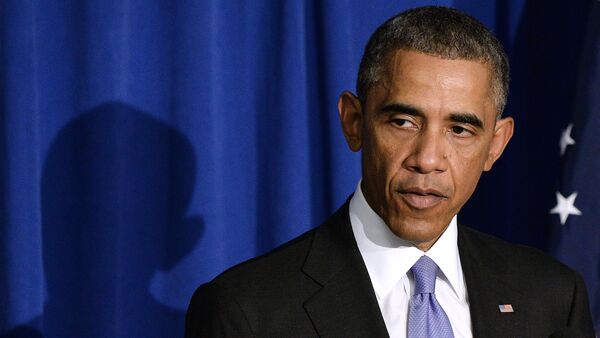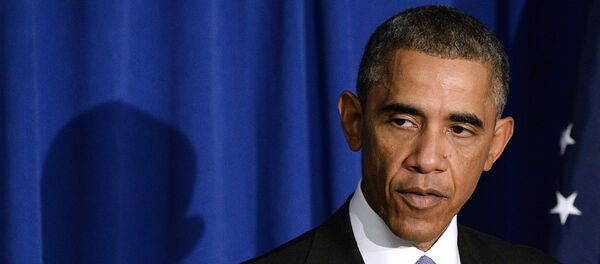In October, the 12 countries of the Pacific Rim region reached an agreement on the wording and subject matter of the TPP trade deal, intended to deregulate trade among signatories which together make up 40 percent of the world economy, including the United States, Australia, Brunei, Canada, Chile, Japan, Malaysia, Mexico, New Zealand, Peru, Singapore and Vietnam.
The TPP trade agreement consists of chapters on a range of issues dealing with trade barriers, intellectual property rights, human rights and government regulations across a host of industries, such as agricultural goods, pharmaceuticals and manufacturing.
On November 5, Obama formally notified Congress about his decision to sign the TPP agreement, thereby initiating a 60-day review process by the general public, after which the US president intends to sign the deal. US Congress will then have another 90 days to consider the deal, which the White House appears confident will happen despite it being steeped in controversy.
"I have notified Congress of my intention to enter into a free trade agreement… which will generate export opportunities for US manufacturers, service suppliers, farmers, ranchers and businesses; help create jobs in the United States; and help American consumers save money while offering them more choices," Obama said in a letter to US lawmakers.
Unfair trade and secrecy
A number of trade experts have roundly denounced TPP as being anything but free and fair, calling it a "mercantilist" agreement that "manages" trade and allows countries like the United States to selectively pick when to lower trade barriers.
"What really happens in these negotiations is not a collective sense of free trade, but a self-interested sense of managed trade, where each country is taking a rather mercantilist position sector by sector," former UN trade delegate Raj Bhala told Sputnik in October.
The agreement is favorable to large multinational corporations, especially pharmaceutical companies who want to "export" regulations onto foreign competitors, including 37-year patent protections, even on life-saving drugs, Bhala added.
The TPP deal also undermines domestic companies, laws, regulations and institutions with an extra-judicial Investor-State Dispute Settlement (ISDS) that stacks the deck in favor of multinational corporations.
Even the US Trade Representative recognizes there is discomfort that ISDS provides an additional channel for foreign investors to sue local governments, which is why Washington is supposedly trying to reform it.
"[ISDS] does provide… the right for foreigners to choose impartial arbitration rather than domestic courts when alleging that the government itself has breached its international obligations," the US Trade Representative stated, including "by discriminating against a foreign investor."
Critics have also blasted the White House for conducting the entire TPP negotiations process under a cloak of secrecy. The negotiations have been ongoing for the past decade, but the contents of the prospective agreement have not been made public until recently.
Obama has also been criticized for lack of transparency for attempting to "fast track" the TPP deal through Congress. Fast-track authority allows Obama to negotiate free trade agreements without the Congress being able to amend them, except voting for or against.
Claudio Ruiz, the executive director of the Chilean Derechos Digitales NGO told Sputnik that the secrecy of the negotiations leading to the TPP free trade agreement does not allow for civil society of participating countries to estimate the possible costs and benefits of the deal.
In October, US labor union official Celeste Drake told Sputnik that the Obama administration has worked really hard to avoid the "secretive" label, yet has failed to allow the negotiations on free trade agreements to be more transparent and democratic.
Rights and environmental abuses
Critics have also charged that several provisions within the TPP violate a range of human rights, civil liberties and environmental standards.
"[TPP] backtracks on previous progress made during the era of Bush for… protections for the environment," Public Citizen’s Global Trade Watch international program associate Jessa Boehner said.
Environmental organization Sierra Club Executive Director Michael Brune said in a statement released in the wake of TPP’s signing that the free trade agreement threatens families and the environment in the United States.
"[I]f passed, it [TPP] would undermine decades of environmental progress and threaten our climate," Brune stated.
The agreement, he added, would expand trade in dangerous fossil fuels that would increase fracking and imperil US environmental standards.
Privacy rights could also become a victim of TPP, according to the Electronic Frontier Foundation (EFF), a US digital rights group. TPP would weaken regulations governing the exchange of personal data between technology companies across international borders, EFF claimed.
"To characterize this as establishing any standard of data protection at all for the TPP countries is laughable; on the contrary, it legitimizes the lack of effective protection and fails to raise the bar even an inch," EFF said in a statement in November.
Labor unions complained that US jobs were going to be sent to countries with no respect for human dignity that employ slave labor.
"TPP will facilitate the export of American jobs to countries… which lack fundamental labor rights, some of which even engage in slave labor," International Association of Machinists and Aerospace Workers President Tom Buffenbarger said in a press release in October.
Economic impact
The US Trade Representative and other proponents of TPP claim it’s "an ambitious, 21st-century" agreement that will "enhance trade and investment among the TPP partner countries, promote innovation, economic growth and development, and support the creation and retention of jobs."
In October, the White House in a release stressed that the agreement enables "unprecedented access" to Asia-Pacific market for US businesses.
"TPP levels the playing field for American workers and American businesses by eliminating over 18,000 taxes that various countries impose on Made in America exports," the release stated.
US Secretary of State John Kerry claimed TPP would boost the US economy and shape economic and strategic relationships in the Asia-Pacific region "long into the future."
"TPP will spur economic growth and prosperity, enhance competitiveness and bring jobs to American shores," Kerry added.
White House claims that the deal will bring prosperity to America were roundly refuted by US Democrats in Congress and on the presidential campaign trail.
"Wall Street and other big corporations have won again. It is time for the rest of us to stop letting multi-national corporations rig the system to pad their profits at our expense," Senator Bernie Sanders, a Democratic Party US presidential candidate, said only minutes after the agreement was announced by its chief negotiators.
Sanders denounced the free trade deal as "disastrous," arguing it will "hurt consumers and cost American jobs."
US labor unions protested that the TPP trade agreement will lead to major job losses that will only hurt the US middle class like the previous free trade agreements.
"It would simply continue the offshoring of jobs and weakening of our communities that started under the North American Free Trade Agreement and hasn’t stopped," Communication Workers of America Communications Director Candice Johnson told Sputnik.




